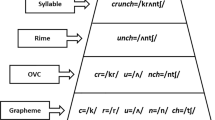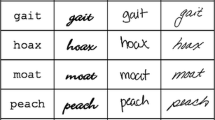Abstract
Six different measures of orthographic processing (three different letter string choice tasks, two orthographic choice tasks, and a homophone choice task) were administered to thirty-nine children who had also been administered the word recognition subtest of the Metropolitan Achievement Test and a comprehensive battery of tasks assessing phonological processing skill (four measures of phonological sensitivity, nonword repetition, and pseudoword reading). The six orthographic tasks displayed moderate convergence – forming one reasonably coherent factor. Hierarchical regression analyses indicated that a composite measure of orthographic processing skill predicted variance in word recognition after variance accounted for by the phonological processing measures had been partialed out. A measure of print exposure predictedvariance in orthographic processing after the variance in phonologicalprocessing had been partialed out.
Similar content being viewed by others
References
Barker, K., Torgesen, J.K. & Wagner, R.K. (1992). The role of orthographic processing skills on five different reading tasks, Reading Research Quarterly 27: 334-345.
Barron, R. (1986). Word recognition in early reading: A review of the direct and indirect access hypothesis, Cognition 24: 93-119.
Berninger, V. (ed.) (1994). Varieties of orthographic knowledge: Theoretical and developmental issues (Vol. 1). Dordrecht, The Netherlands: Kluwer Academic.
Berninger, V. (ed.) (1995). Varieties of orthographic knowledge: Theoretical and developmental issues (Vol. 2). Dordrecht, The Netherlands: Kluwer Academic.
Bradley, L. & Bryant, P.E. (1978). Difficulties in auditory organization as a possible cause of reading backwardness, Nature 271: 746-747.
Brady, S. & Shankweiler, D. (eds.) (1991). Phonological processes in literacy. Hillsdale, NJ: Erlbaum.
Braten, I., Lie, R., Andreassen, R. & Olaussen, B.S. (1999). Leisure time reading and orthographic processes in word recognition among Norwegian third-and fourth-grade students. Reading and Writing: An Interdisciplinary Journal 11: 65-88.
Bruce, D. (1964). The analysis of word sounds by young children, British Journal of Educational Psychology 34: 158-170.
Bryant, P. & Impey, L. (1986). The similarities between normal readers and developmental and acquired dyslexics, Cognition 24: 121-137.
Calfee, R., Chapman, R. & Venezky, R. (1972). How a child needs to think to learn to read. In: L.W. Gregg (ed.), Cognition in learning and memory (pp. 139-182). New York, N.Y.: John Wiley & Sons.
Cassar, M. & Treiman, R. (1997). The beginnings of orthographic knowledge: Children's knowledge of double letters in words, Journal of Educational Psychology 89: 631-644.
Castles, A. & Coltheart, M. (1993). Varieties of developmental dyslexia, Cognition 47: 149-180.
Chateau, D. & Jared, D. (2000). Exposure to print and word recognition processes, Memory & Cognition 28: 143-153.
Cipielewski, J. & Stanovich, K.E. (1992). Predicting growth in reading ability from children's exposure to print, Journal of Experimental Child Psychology 54: 74-89.
Coltheart, V. & Leahy, J. (1992). Children's and adult's reading of nonwords: Effects of regularity and consistency, Journal of Experimental Psychology: Learning, Memory, and Cognition 18: 718-729.
Cunningham, A.E. & Stanovich, K.E. (1990). Assessing print exposure and orthographic processing skill in children: A quick measure of reading experience, Journal of Educational Psychology 82: 733-740.
Cunningham, A.E. & Stanovich, K.E. (1991). Tracking the unique effects of print exposure in children: Associations with vocabulary, general knowledge, and spelling, Journal of Educational Psychology 83: 264-274.
Cunningham, A.E. & Stanovich, K.E. (1993). Children's literacy environments and early word recognition skills, Reading and Writing: An Interdisciplinary Journal 5: 193-204.
Cunningham, A.E. & Stanovich, K.E. (1997). Early reading acquisition and its relation to reading experience and ability ten years later, Developmental Psychology 33: 934-945.
Dunn, L.M. & Markwardt, F.C. (1970). Peabody Individual Achievement Test. Circle Pines, MN: American Guidance Service.
Ehri, L.C. (1984). How orthography alters spoken language competencies in children learning to read and spell. In: J. Downing & R. Valtin (eds.), Language awareness and learning to read (pp. 119-147). New York: Springer-Verlag.
Ehri, L.C. (1995). Phases of development in learning to read words by sight, Journal of Research in Reading 18: 116-125.
Ehri, L.C. (1997). Sight word learning in normal readers and dyslexia. In: B. Blachman (eds.), Foundations of reading acquisition and dyslexia: Implications for early intervention (pp. 163-189). Mahweh, NJ: Erlbaum.
Freebody, P. & Byrne, B. (1988). Word-reading strategies in elementary school children: Relations to comprehension, reading time, and phonemic awareness, Reading Research Quarterly 23: 441-453.
Frost, R. (1998). Toward a strong phonological theory of visual word recognition: True issues and false trails, Psychological Bulletin 123: 71-99.
Gathercole, S.E. & Baddeley, A.D. (1993). Working memory and language. Hove, England: Erlbaum.
Gough, P.B., Ehri, L. & Treiman, R. (eds.) (1992). Reading acquisition. Hillsdale, N.J.: Erlbaum Associates.
Hoien, T., Lundberg, I., Stanovich, K.E. & Bjaalid, I. (1995). Components of phonological awareness, Reading and Writing: An Interdisciplinary Journal 7: 171-188.
Juel, C., Griffith, P.L. & Gough, P.B. (1986). Acquisition of literacy: A longitudinal study of children in first and second grade, Journal of Educational Psychology 78: 243-255.
Liberman, I.Y. & Liberman, A.M. (1990). Whole language versus code emphasis: Underlying assumptions and their implications for reading instruction, Annals of Dyslexia 40: 51-77.
Manis, F.R., Seidenberg, M.S., Doi, L.M., McBride-Chang, C. & Peterson, A. (1996). On the bases of two subtypes of developmental dyslexia, Cognition 58: 157-195.
McBride-Chang, C. (1995). What is phonological awareness? Journal of Educational Psychology 87: 179-192.
McBride-Chang, C., Wagner, R.K. & Chang, L. (1997). Growth modeling of phonological awareness, Journal of Educational Psychology 89: 621-630.
McBride-Chang, C., Manis, F., Seidenberg, M.S., Custodio, R. & Doi, L. (1993). Print exposure as a predictor of word reading and reading comprehension in disabled and nondisabled readers, Journal of Educational Psychology 85: 230-238.
Olson, R.K., Forsberg, H., Wise, B. & Rack, J. (1994). Measurement of word recognition, orthographic, and phonological skills. In: G.R. Lyon (eds.), Frames of reference for the assessment of learning disabilities (pp. 243-277). Baltimore, MD: Brookes.
Olson, R., Wise, B., Conners, F., Rack, J. & Fulker, D. (1989). Specific deficits in component reading and language skills: Genetic and environmental influences, Journal of Learning Disabilities 22: 339-348.
Perfetti, C.A. (1985). Reading ability. New York: Oxford University Press.
Perfetti, C.A. (1995). Cognitive research can inform reading education, Journal of Research in Reading 18: 106-115.
Share, D.L. (1995). Phonological recoding and self-teaching: Sine qua non of reading acquisition, Cognition 55: 151-218.
Share, D.L. & Stanovich, K.E. (1995). Cognitive processes in early reading development: Accommodating individual differences into a model of acquisition, Issues in Education: Contributions from Educational Psychology 1: 1-57.
Siegel, L.S. & Ryan, E.B. (1988). Development of grammatical-sensitivity, phonological, and short-term memory skills in normally achieving and learning disabled children, Developmental Psychology 24: 28-37.
Siegel, L.S., Share, D. & Geva, E. (1995). Evidence for superior orthographic skills in dyslexics, Psychological Science 6: 250-254.
Snowling, M.J. (1995). Phonological processing and developmental dyslexia, Journal of Research in Reading 18: 132-138.
Snowling, M.J. (1996). Contemporary approaches to the teaching of reading, Journal of Child Psychology and Psychiatry 37: 139-148.
Stahl, S.A. & Murray, B. (1994). Defining phonological awareness and its relationship to early reading, Journal of Educational Psychology 86: 221-234.
Stanovich, K.E. (1986). Matthew effects in reading: Some consequences of individual differences in the acquisition of literacy, Reading Research Quarterly 21: 360-407.
Stanovich, K.E. (1988). Explaining the differences between the dyslexic and the gardenvariety poor reader: The phonological-core variable-difference model, Journal of Learning Disabilities 21: 590-612.
Stanovich, K.E., Cunningham, A.E. & Cramer, B. (1984). Assessing phonological awareness in kindergarten children: Issues of task comparability, Journal of Experimental Child Psychology 38: 175-190.
Stanovich, K.E. & Siegel, L.S. (1994). The phenotypic performance profile of readingdisabled children: A regression-based test of the phonological-core variable-difference model, Journal of Educational Psychology 86: 24-53.
Stanovich, K.E., Siegel, L.S. & Gottardo, A. (1997). Converging evidence for phonological and surface subtypes of reading disability, Journal of Educational Psychology 89: 114-127.
Stanovich, K.E. & West, R.F. (1989). Exposure to print and orthographic processing, Reading Research Quarterly 24: 402-433.
Treiman, R. (1984). Individual differences among children in reading and spelling styles, Journal of Experimental Child Psychology 37: 463-477.
Treiman, R. (1993). Beginning to spell: A study of first grade children. New York: Oxford University Press.
Tunmer, W.E. & Nesdale, A.R. (1985). Phonemic segmentation skill and beginning reading, Journal of Educational Psychology 77: 417-427.
Vellutino, F.R., Scanlon, D.M. & Tanzman, M. (1994). Components of reading ability. In: G.R. Lyon (eds.), Frames of reference for the assessment of learning disabilities (pp. 279-329). Baltimore, MD: Brookes.
Wagner, R.K., Torgesen, J.K., Laughon, P., Simmons, K. & Rashotte, C.A. (1993). Development of young readers' phonological processing abilities, Journal of Educational Psychology 85: 83-103.
Wagner, R.K., Torgesen, J.K. & Rashotte, C.A. (1994). Development of reading-related phonological processing abilities: New evidence of bidirectional causality from a latent variable longitudinal study, Developmental Psychology 30: 73-87.
Wagner, R.K., Torgesen, J.K., Rashotte, C.A., Hecht, S.A., Barker, T.A., Burgess, S.R., Donahue, J. & Garon, T. (1997). Changing causal relations between phonological processing abilities and word-level reading as children develop from beginning to skilled readers: A 5-year longitudinal study, Developmental Psychology 33: 468-479.
Yopp, H.K. (1988). The validity and reliability of phonemic awareness tests, Reading Research Quarterly 23: 159-177.
Author information
Authors and Affiliations
Corresponding author
Rights and permissions
About this article
Cite this article
Cunningham, A.E., Perry, K.E. & Stanovich, K.E. Converging evidence for the concept of orthographic processing. Reading and Writing 14, 549–568 (2001). https://doi.org/10.1023/A:1011100226798
Issue Date:
DOI: https://doi.org/10.1023/A:1011100226798




